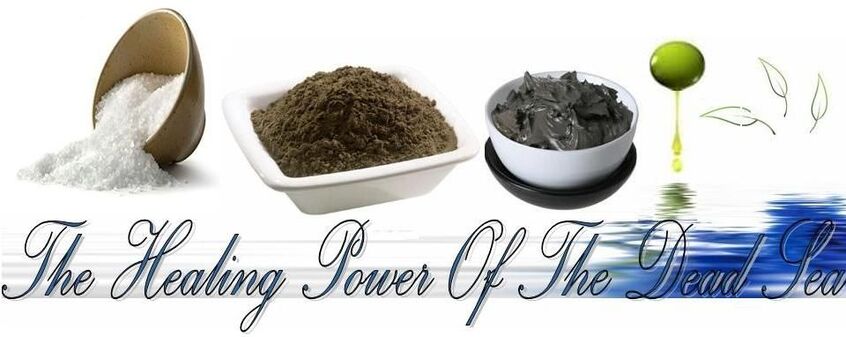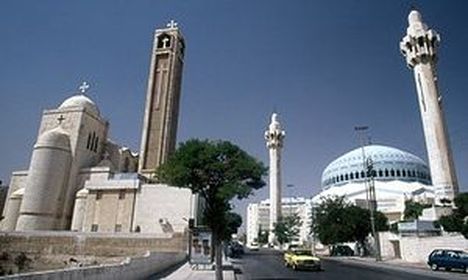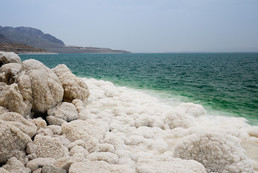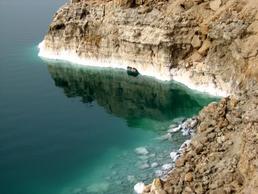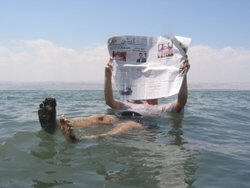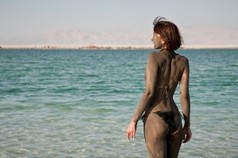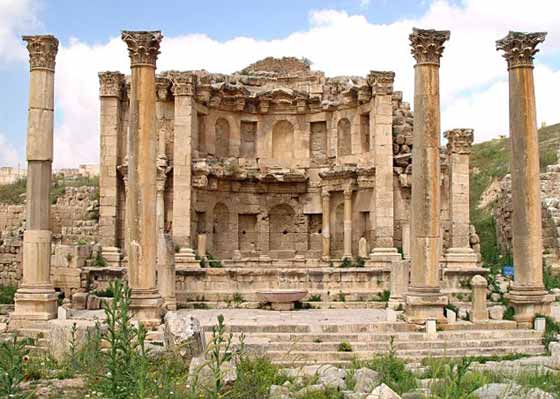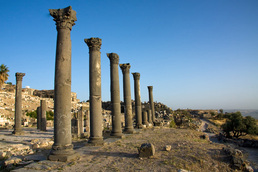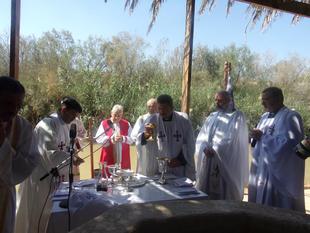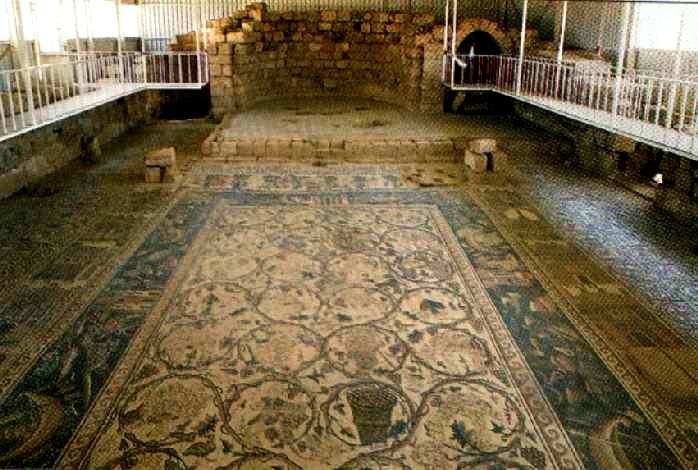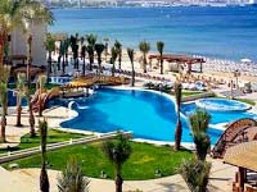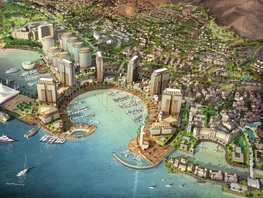The Hashemite Kingdom Of Jordan
Pope Francis in Jordan Reaches out Christians and Muslims In Jordan on May 24. 2014
Pope Francis, Welcome in Amman VIDEO
Jordan (/ˈdʒɔrdən/; Arabic: الأردن al-Urdun), officially the Hashemite Kingdom of Jordan (Arabic: المملكة الأردنية الهاشمية al-Mamlakah al-Urdunīyah al-Hāshimīyah), is an Arab kingdom in Western Asia, on the East Bank of the Jordan River, and extending into the historic region of Palestine. Jordan borders Saudi Arabia to the south and east, Iraq to the north-east, Syria to the north, and Palestine, the Dead Sea and Israel to the west.
Amman was named one of the MENA's best cities according to economic, labor, environmental, and socio-cultural factors. Amman is among the most popular locations for multinational corporations to set up their regional offices, alongside Doha and only behind Dubai. Furthermore, it is expected that in the next 10 years these three cities will capture the largest share of multinational corporation activity in the region.It is a major tourist destination in the region and the capital is especially popular among Gulf tourists.
Language : The official language is Modern Standard Arabic, a literary language taught in the schools. The native languages of most Jordanians are dialects of Jordanian Arabic, a nonstandard version of Arabic with many influences from English, French and Turkish. Jordanian Sign Language is the language of the deaf community.
English, though without an official status, is widely spoken throughout the country and is the de facto language of commerce and banking, as well as a co-official status in the education sector; almost all university-level classes are held in English.
Russian, Circassian, Armenian, Tagalog, Tamil, and Chechen are quite popular among their communities and acknowledged widely in the kingdom.
Religion : Jordan has laws promoting religious freedom , Muslim & Christians Live in a Harmony in a Small Country
English, though without an official status, is widely spoken throughout the country and is the de facto language of commerce and banking, as well as a co-official status in the education sector; almost all university-level classes are held in English.
Russian, Circassian, Armenian, Tagalog, Tamil, and Chechen are quite popular among their communities and acknowledged widely in the kingdom.
Religion : Jordan has laws promoting religious freedom , Muslim & Christians Live in a Harmony in a Small Country
Dead Sea Health Benefits & Treatments
|
The Dead Sea area has become a major center for health research and treatment for several reasons. The mineral content of the water, the very low content of pollens and other allergens in the atmosphere, the reduced ultraviolet component of solar radiation, and the higher atmospheric pressure at this great depth each have specific health effects. For example, persons experiencing reduced respiratory function from diseases such as cystic fibrosis seem to benefit from the increased atmospheric pressure.
The region's climate and low elevation have made it a popular center for several types of therapies:
Treatment for rhinosinusitis Rhinosinusitis patients receiving Dead Sea saline nasal irrigation exhibited significantly better symptom relief compared to standard hypertonic saline spray. Treatment for osteoarthritis Dead Sea mud pack therapy has been suggested to temporarily relieve pain in patients with osteoarthritis of the knees. According to researchers of the Ben Gurion University of the Negev, treatment with mineral-rich mud compresses can be used to augment conventional medical therapy. Dead Sea Mud Even the mud from the Dead Sea is an important element. You will see many people slathering it on their face and body for full therapeutic benefits. Arthritis sufferers have found that the mud can be effective in treating their condition as the mud stimulates blood circulation. The mud from the Dead Sea is also used for many skin treatments since it has a high concentration of minerals in it. It can clear up flaky dry skin problems or just give your skin a more youthful, healthy glow.
|
Dead Sea water The salt from the Dead Sea contains 21 minerals, 12 of which you won’t find in any other body of water. It has an extremely high content of magnesium, which is believed to have several healing properties and is especially good for the skin. That is one reason why people buy Dead Sea bathing salts to use at home, but of course it is much better to bath in the Dead Sea itself. The salt will rejuvenate skin and may help clear up some skin conditions such as eczema and psoriasis. Magnesium is also known for its power to help heal cuts to the skin.
|
Ancient City of Petra
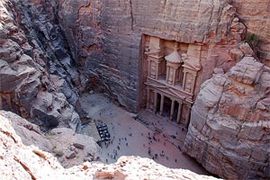
Petra is one of the UNESCO sites that Jordan has to offer. Located in a mountainous region of the country, this awe-inspiring ancient city was rediscovered in 1812. Petra is a city that was carved into the rock face of the mountains by the Nabataeans, an ancient Arab people. It became a major trade route center for numerous cultures. Today it is Jordan’s most visited tourist attraction. It will take you several days to explore this vast city and see all it has to offer. The entrance to Petra, called the Siq, sets the tone for what you will experience. Walking through this narrow gorge with high cliffs on either side transports you back in time to another world. At the end of this you will come out to the Treasury and begin exploring this marvelous wonder of ancient architecture.
Wadi Rum
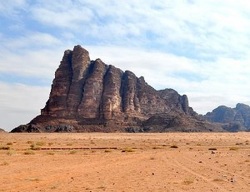
Wadi Rum, known as the Valley of the Moon, is a desert landscape shaped by nature, made up of sand and rock. It is here that any serious hikers will find their own paradise to explore. You will be able to hire guides, either in a 4×4 vehicle or on camels for the really adventurous, for a tour of the valley. It is a popular site to stay overnight, out in the wilderness, to get a feel for the nomadic lifestyle that still exists there today. The Bedouin tribes inhabit the area and are known for their hospitality to visitors.
Visiting the Wadi Rum will give you a sense of being in another time and place.
Visiting the Wadi Rum will give you a sense of being in another time and place.
Jerash
|
Next not to miss site in Jordan is another ancient city named Jerash. Inhabited for thousands of years, including times as a Greek and then Roman city, Jerash was only recently excavated within the last century. It is also an immense city of architectural wonders. You enter the city through Hadrian’s Arch which sets the stage for your visit. Onwards you will discover the Hippodrome, home to the chariot races, the Oval Plaza, which has two alters surrounded by towering 1st century columns, and many other magnificent stone structures.
|
Umm Qais
|
Umm Qais (Arabic: أم قيس, also transliterated as Umm Qays) is a town in northern Jordan near the site of the ancient town of Gadara. It is situated in the extreme north-west of the country, where the borders of Jordan, Israel and Syria meet, perched on a hilltop (378 metres above sea level), overlooking the sea of Tiberias, the Golan heights and the Yarmuk gorge. Umm Qais is in Jordan's Irbid Governorate and belongs to the Bani Kinanah Department.
|
The Baptism Site of Jesus Christ
|
The Baptism Site of Jesus Christ
The baptism of Jesus marks the beginning of his public ministry. This event is recorded in the canonical gospels of Matthew, Mark and Luke. John's gospel does not directly describe Jesus' baptism.Jesus was baptized by John the Baptist as an historical event to which a high degree of certainty can be assigned. Along with the crucifixion of Jesus, most scholars view it as one of the two historically certain facts about him, and often use it as the starting points for the study of the historical Jesus |
Madaba
|
Madaba (Arabic: مادبا), is the capital city of Madaba Governorate in central Jordan, which has a population of about 60,000. It is best known for its Byzantine and Umayyad mosaics, especially a large Byzantine-era mosaic map of The Holy Land. Madaba is located 30 kilometers (19 miles) south-west of the capital Amman.
|
Aqaba
|
Aqaba is a Jordanian coastal city situated at the northeastern tip of the Red Sea. Aqaba is the largest city on the Gulf of Aqaba and Jordan's only coastal city. The city of Aqaba is the capital of Aqaba Governorate. Aqaba is one of the major tourist attractions in Jordan, and famous for its warm water and rich marine life. It is best known today as a seaside and diving resort and also as a home for Jordan's mega projects.
|
|
Near Future Plans in Aqaba
It will be master planning the biggest mixed-use project in Jordan’s history. The $10 billion, 60-million-square-foot waterfront project in Aqaba, Jordan includes high-rise residential towers, business and financial districts, retail and entertainment spaces and several hotels and resorts. Look for more on that project in an upcoming DJC. |
